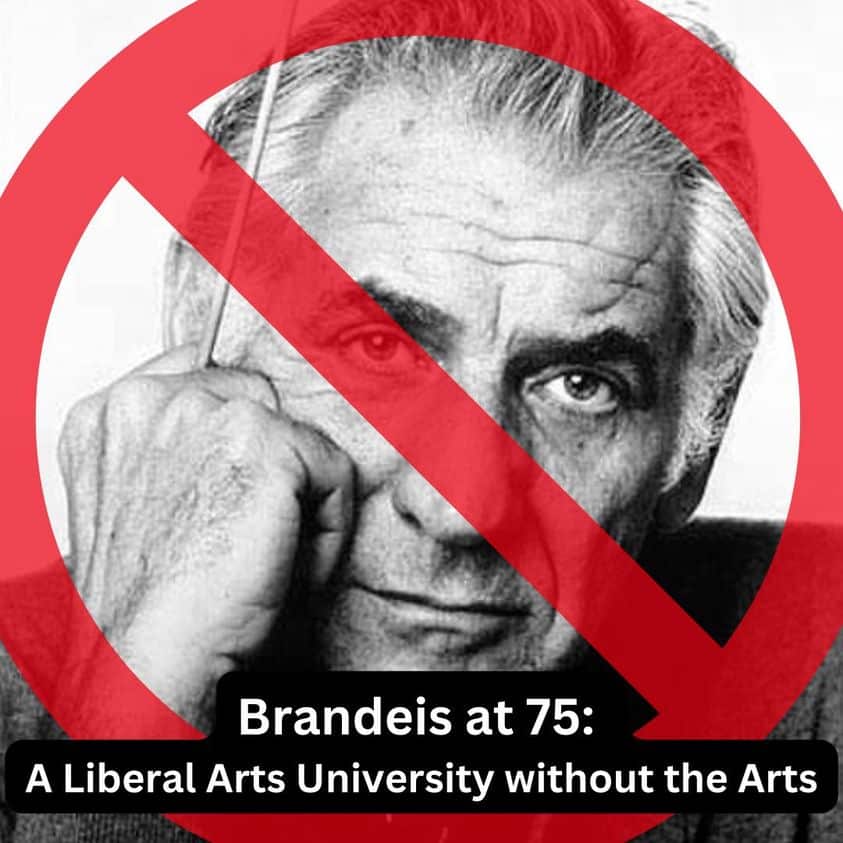Sign of the times: Brandeis cancels music
NewsFaculty members are spreading the word that Brandeis University, one of America’s most prestigious colleges, has abolished its PhD programs in composition and musicology and put its PhD teaching staff on hiatus.
Assistant Professor Emily Frey Giansiracusa writes: As some of you know, our Provost told us in May that the Musicology graduate program at Brandeis would be put on hiatus, with the intention of restoring it when the University’s finances improved. The administration told us today that BOTH Musicology and Composition will be put on hiatus following this year – now with the intention of closing them permanently and shifting their scant resources to the sciences. This recommendation was made in spite of the results of an 18-month-long review of all Brandeis PhD programs, which found that Musicology and Composition ranked at or very near *the top* of all programs by every metric the PhD review team claimed to value. These elements included job placement rate, attrition, matriculation, and many other measures by which we were found to be excellent.
Despite the fact that our President has a background in economics, the administration makes this recommendation contrary to all economic sense; comparatively speaking, the PhD programs in Music are dirt cheap to run, and they produce among the best results at Brandeis. This decision is based, rather, on values: the Brandeis administration does not believe that the arts and humanities are worthy of study at the graduate level. It’s an attitude that smacks of the techno-utopianism of 15 years ago – before Silicon Valley realized that it might have to think about the ethical and historical questions in which artists and humanists are expert, before ChatGPT and generative AI pushed questions about the nature of human creation to the front page of every newspaper. This is an exceptionally strange time to declare so confidently that the arts and humanities don’t matter, but here we are.






Brandeis has a very obvious liberal arts focus so to state that the administration doesn’t believe the arts and humanities are worthy of study at graduate level seems very odd.
It would be interesting to hear from the other side.
It’s not at all odd, because the point is that the current administration is shifting away from its liberal arts heritage.
I agree – what’s the other side? Might there be an overabundance of schools in just Boston to study musicology or composition ? There’s NEC, Boston University, Harvard, Berklee, Tufts, and no doubt more. Some (I’m not voting) would say that several of those programs are superior to Brandeis’ program. What’s wrong with concentrating on your stronger departments?
Why is Bernstein’s photo here? He want to Harvard.
He was a professor at Brandeis, 1951-1956.
did not know that – thanks
He taught at Brandeis not long
after it was founded.
Humanities PhD programs are rackets that enable tenured (and tenure-track) faculty to slough off some of their teaching responsibilities onto underpaid doctoral students who also serve as part-time course instructors or teaching assistants. As a result, academia is producing far too many PhDs than the tenure-track market can bear and most of the grad students don’t get tenure-track jobs when they finish their degrees—the best academic teaching jobs they can find are contingent gigs. Brandeis has recently offered a “Connected PhD” program that sought to prepare their doctoral students for alternative careers outside academia, though it seems like a ruse attempting to convince new graduate applicants to keep enrolling in programs that exploit their labor in this way.
https://www.brandeis.edu/gsas/professional/connected-phd/index.html
But actually cutting graduate programs is the more honest solution; one hopes that other humanities departments will follow Brandeis’s example, get rid of the worthless PhD rackets and assign the tenured and tenure-track faculty higher teaching loads to cover the grad students’ teaching duties.
That’s all completely true.
I have friends with PhDs in the humanities. The only jobs in academy are 1 to 2 year teaching stints as a non-tenure track assistant professor with terrible pay (imagine being in your mid 30s, having obtained a PhD, and only being paid $50k). When the job ends, that’s it — you’re done teaching at the school. Contrast that to most jobs where you have your job indefinitely unless you screw something up and get fired or there are layoffs.
And the number of people who apply for these positions is insane. You move all of the country taking these assistant professor jobs as you can get them. And tenure-track positions are so rare that maybe there are 3 or 4 in your field available to apply for each year.
They are not “canceling music”- their performance areas remain incredibly healthy. They are canceling musicology, which has nothing to do with music.
Musicology has nothing to do with music?
A musicologist friend likes to say that musicology is to music as scientology is to science.
More to do with -ology than with music, in any case.
(1) Your statement about musicology is glib but wrong.
(2) They are also canceling composition, which — as far as I know — has something to do with music.
(3) Maintaining music performance without composition merely reinforces the notion that serious music is nothing but a museum culture.
Wow, I truly feel sad for you having such a pitifully small mind.
If you bothered to look into what actually passes for musicology at most universities, you’d agree that musicology is barely related to the study of actual music anymore.
Couldn’t agree with you more, Monty. I can’t imagine a more useless bunch than musicologists, at least in the anglophone world, where what’s practiced in the discipline of supposed “musicology” is politics and/or sociology, but certainly not music, and least of all that which has been produced by “cishet” dead white men. Good riddance!
Brandeis’ composition and musicology programs are world class. Their performance program isn’t in that league, and exists only at the undergraduate level. This is gutting everything that makes the department great, and I suspect is at least partially aimed at forcing out the (relatively, but not compared to the sciences) expensive tenured faculty to be replaced (maybe) with cheaper, exploitable adjuncts.
Musicology has nothing to
do with music? That’s like saying a recipe has nothing to do with food. By the way,
they’re also canceling the composition program. Do you think composition but, of
course, composing has nothing to do with music.
“Musicology has nothing to
do with music? That’s like saying a recipe has nothing to do with food.”
If Musicology were comparable to a recipe it would be one that leaves out the most important ingredients and is incapable of recreating anything of any use to anyone except people writing recipes.
It’s a totally a mickey mouse subject. Of course there aren’t enough jobs!
This debate has revealed a lot of differing perspectives but it’s glib to say that musicology has nothing to do with music. Performance of baroque music has benefitted greatly from the study of treatises, manuscripts, letters, etc., written at the time and has resulted in a surge of interest and appreciation of baroque music.
‘Excellent job placement record of PhD program graduates’? Where? As Full professors at universities? Adjuncts paid peanuts? High school teachers? Maybe something else entirely?
Thin on specifics, thick on histrionics. There are way too many musicologists as it is.
The Brandeis website includes rather lengthy (and specific) lists of composition/theory/musicology alums along with their current academic placements. You will notice that the lists contain some of the most prominent scholars in the fields.
https://www.brandeis.edu/music/graduate/composition/alumni.html
https://www.brandeis.edu/music/graduate/musicology/alumni.html
There is about 60 names, many of which little known, a few are deceased. thin on specifics, like ‘lecturer’ (read, adjunct), or, ‘composes actively’, sure, OK – and this is going back 70 years, multiple graduates from the 50s and 60s. I still don’t see how this is a loss to the world other than to a small interest group.
According to their website, since 2010 only five alumni have secured tenure-track academic teaching positions (and not all tenure-track)
https://www.brandeis.edu/music/graduate/musicology/alumni.html
Only one of these was within the last eleven years:
• Gilad Harel ’12, Assistant Professor of Music, Naugatuck Valley Community College
• Sarah Caissie Provost ’11, Assistant Professor, University of North Florida, Jacksonville
• Alex Ludwig ’11, Assistant Professor in the Liberal Arts Department, Berklee School of Music
• Charles Stratford, ’18, Professor (tenure-track), Department of Humanities and Philosophy, Brigham Young University-Idaho
• Reba Wissner ’12, Assistant Professor of Musicology, Columbus State University’s Schwob School of Music
how many world-class mathematicians, household names within their discipline (to pick just one example) can most people name? OK – let’s get rid of mathematics! The idea that any music study is supposed to generate only famous people is foolish and small-minded.
Crying wolf again?
I presume its undergraduate and master’s programs in music will continue? Hence, the world is not ending?
A quick check of the university’s website (https://www.brandeis.edu/learning/graduate.html) confirms that there are BAs, MAs, and MFAs in addition to the PhD.
I did my first degree at Brandeis, at a time when the music department was entirely focused on composition and musicology; performance was entirely extra-curricular. You may think that the job that the PhD compositions students (several of whom became eminent composers and professors) did as teaching assistants was grunt work that merely allowed overpaid professors (Arthur Berger, Harold Shapero, Martin Boykan et al.) to slough off unpleasant duties, but those graduate students provided extremely valuable counter-examples to what we were getting from their “betters,” as well as the new ideas that a younger generation should be filled with. I would not have wanted to be without either — both sides (faculty and grad students) provided guidance that has fed all of my professional life. And while I’m focusing on the composition side here, the musicology side (Margaret Bent, Allan Keiler among others) was equally valuable — not only in music history and theory, but also in performance: they were and are genuine musicians.
The result was that the department produced a remarkable number of working musicians — composers, musicologists, performers, theater sound engineers, etc. — who have made significant contributions to the art, way beyond what its small size would normally have predicted. And others have become eminent in their non-musical professional areas, their minds fertilized by the intellectual ferment of the music department.
This decision, if it goes through, is a shande. What is Ron Liebowitz thinking??
In today’s higher education environment, when it comes to allocating scant financial resources, the arts will always play second fiddle to the sciences! It’s just a fact of academic life! We can survive without culture but not without crudites! How sad!
Musicology is not art. Sometimes, it’s helpful. Other times, it injects ideologies du jour, obscurantism, inane and ultimately useless findings into an esoteric field, and the fact that music is something beautiful escapes most musicologists entirely. (That very word makes some of them cringe.) Close first hand experience.
I cannot evaluate the scant resources argument without data on what has happened to administrative costs and expenditures on brick and mortar in recent years at Brandeis. I do know that a number of colleges tend to be rather generous in these areas, while paying nontenured faculty and staff quite poorly and jacking up tuition.
We can survive without culture, but not for long.
Brandeis loves art so much they had to be dragged to court to prevent them from selling the contents of their art museum.
Let me hear some of the PhD compositions coming out of their PhD composition program before I decide that a PhD composition degree is necessary.
Getting a degree in composition is a very circular thing. All it enables is to get a job instructing other people who want to get a degree in composition.
A PhD in composition is not soley to get an academic job. It provides time and resources to develop one’s creative practice. It can be worthwhile regardless of career outcome or should I say, in this cultural environment, it has to be worthwhile regardless of career outcome, or don’t do it.
So sad
Brandeis has lost its identity. Let’s not forget this music department was founded by professors such as Fine and Bernstein and Copeland who all came to find refuge in a Jewish institution after being shunned (denied tenure) at other institutions because of their religious beliefs. This school and programs (all of them) must be maintained to provide unbiased academic access for everyone.
Everybody should watch the 1970 movie “The Forbin Project” and then enthusiastically go fund the arts and liberal arts, which have the ability to frame the right questions and could just save us.
Alumna of Brandeis checking in here. The music department of Brandeis was never strong, and never one of the bigger majors to be offered at the school. It certainly could not compare to the other music programs in the greater Boston area. At this point, the price tag for Brandeis is astronomical, and while they are vying for students wanting to go into music in the competitive Boston area, I am guessing that this was one department that Brandeis looked at for cost cutting. I am remembering the attempt to sell off important pieces of art from the Rose Art museum a few years back and the hubbub that ensued because of it. This is unfortunate, but it’s also part of the heavy decisions that universities have to make in this day and age.
What a pity. Music heals, improves, makes us human! Provost has put on music-canceling headphones. I sentence them to a year of no music. And don’t sing in the shower!
No surprises here and as “Thornhill” perfectly articulated. This has been going on for decades in all the aspects of serious academic music study programs and will continue to wane as it should until it might actually right-size. Massive amounts of whitepaper theses perfect in their adherance to academic form, and generally of questionable content value serve as the evidence that they are exercises to keep staff and students busy. Opportunities for DMA’s and PHD’s after graduation have been and will continue to be uninspiring in quantity and quality. It is not up to either the goverments or societies to fix it. Pursue at one’s own risk.!!
Not surprised. I’ve seen this coming everywhere with less and less places offering live music, like restaurants, clubs etc. Djs mostly or no music, big fests aren’t enough to sustain arts.
the programs remain on the website; someone should apply pronto !
Eventually, turning former full-time career teaching positions into part-time, fry-cook wages will convince people not to get PhD’s anyway.